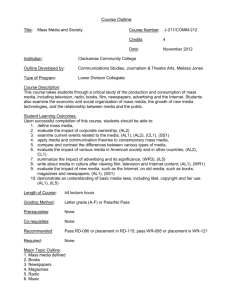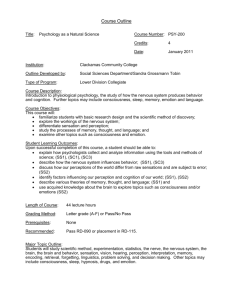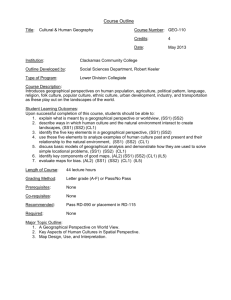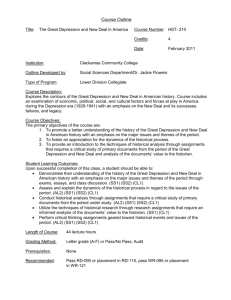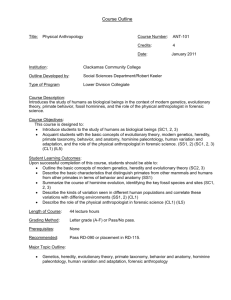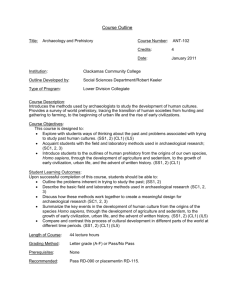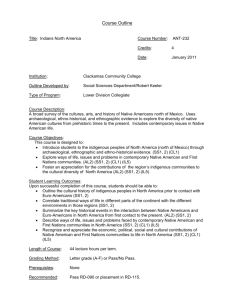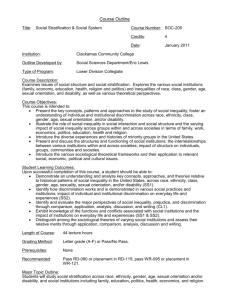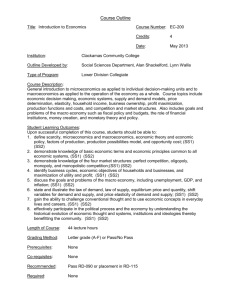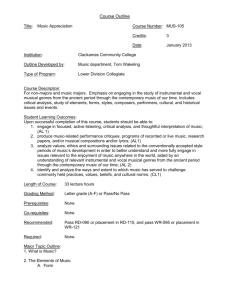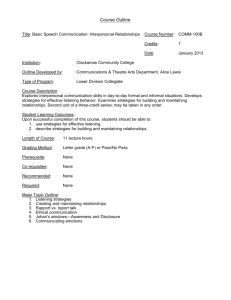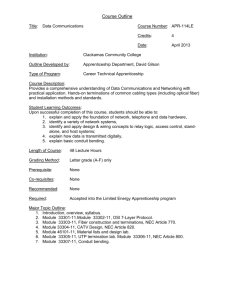Gen Ed SSC 233 Outline - Clackamas Community College
advertisement
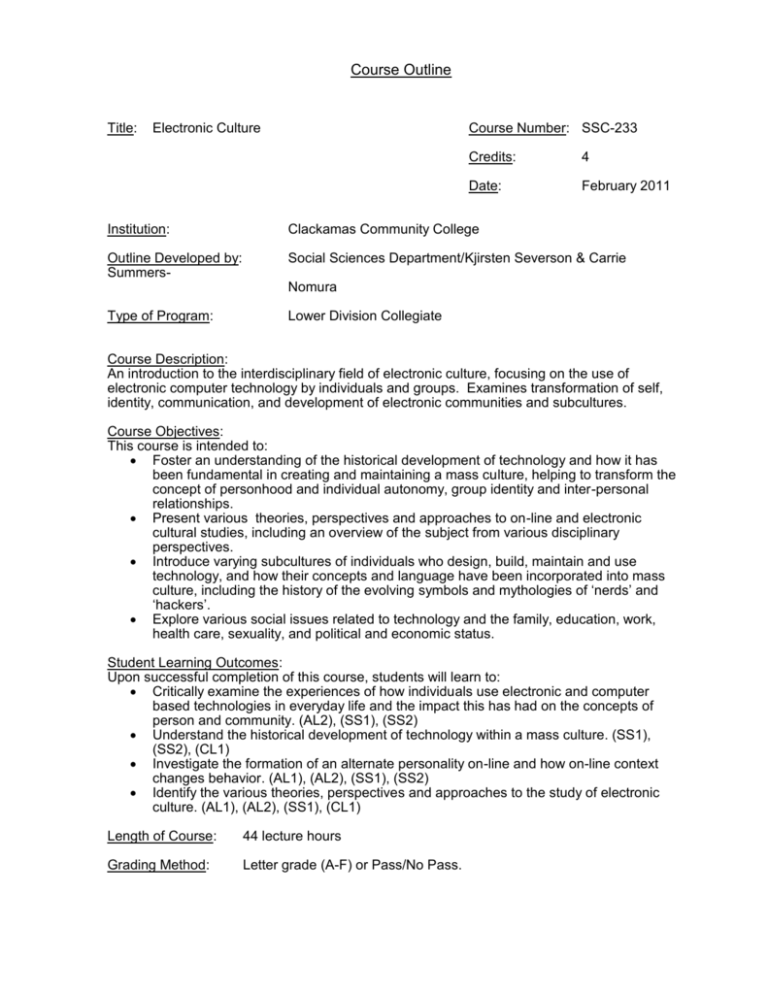
Course Outline Title: Electronic Culture Course Number: SSC-233 Credits: 4 Date: February 2011 Institution: Clackamas Community College Outline Developed by: Summers- Social Sciences Department/Kjirsten Severson & Carrie Nomura Type of Program: Lower Division Collegiate Course Description: An introduction to the interdisciplinary field of electronic culture, focusing on the use of electronic computer technology by individuals and groups. Examines transformation of self, identity, communication, and development of electronic communities and subcultures. Course Objectives: This course is intended to: Foster an understanding of the historical development of technology and how it has been fundamental in creating and maintaining a mass culture, helping to transform the concept of personhood and individual autonomy, group identity and inter-personal relationships. Present various theories, perspectives and approaches to on-line and electronic cultural studies, including an overview of the subject from various disciplinary perspectives. Introduce varying subcultures of individuals who design, build, maintain and use technology, and how their concepts and language have been incorporated into mass culture, including the history of the evolving symbols and mythologies of ‘nerds’ and ‘hackers’. Explore various social issues related to technology and the family, education, work, health care, sexuality, and political and economic status. Student Learning Outcomes: Upon successful completion of this course, students will learn to: Critically examine the experiences of how individuals use electronic and computer based technologies in everyday life and the impact this has had on the concepts of person and community. (AL2), (SS1), (SS2) Understand the historical development of technology within a mass culture. (SS1), (SS2), (CL1) Investigate the formation of an alternate personality on-line and how on-line context changes behavior. (AL1), (AL2), (SS1), (SS2) Identify the various theories, perspectives and approaches to the study of electronic culture. (AL1), (AL2), (SS1), (CL1) Length of Course: 44 lecture hours Grading Method: Letter grade (A-F) or Pass/No Pass. Prerequisites: None Recommended: Pass RD-090 or placement in RD-115; pass WR-095 or placement in WR-121. Major Topic Outline: Varies by quarter, but will include: Electronic Cultural studies; theories, perspectives and approaches Historical development of technology. The formation, development of alternate personalities, “telepersona”, virtual groups and on-line communities; language use and behavior with in on-line contexts. Technology subcultures, engineers, software coders, evolution of hacker ethos. Various social issues related to family, education, work, health care, sexuality, politics and economy. CCC AAOT/ASOT GENERAL EDUCATION OUTCOMES COURSE OUTLINE MAPPING CHART Course Title and Number: SSC-233 Electronic Culture Mark outcomes addressed by this course: Mark “C” if this course completely addresses the outcome. Students who successfully complete this course are likely to have attained this learning outcome. Mark “S” if this course substantially addresses the outcome. More than one course is required for the outcome to be completely addressed. Students who successfully complete all of the required courses are likely to have attained this learning outcome. Mark “P” if this course partially addresses the outcome. Students will have been exposed to the outcome as part of the class, but the class is not a primary means for attaining the outcome and assessment for general education purposes may not be necessary. As a result of completing the AAOT /ASOT general education requirements, students will be able to: WR: Writing Outcomes 1. Read actively, think critically, and write purposefully and capably for academic and, in some cases, professional audiences. 2. Locate, evaluate, and ethically utilize information to communicate effectively. 3. Demonstrate appropriate reasoning in response to complex issues. SP: Speech/Oral Communication Outcomes 1. Engage in ethical communication processes that accomplish goals. 2. Respond to the needs of diverse audiences and contexts. 3. Build and manage relationships. MA: Mathematics Outcomes 1. Use appropriate mathematics to solve problems. 2. Recognize which mathematical concepts are applicable to a scenario, apply appropriate mathematics and technology in its analysis, and then accurately interpret, validate, and communicate the results. AL: Arts and Letters Outcomes i 1. Interpret and engage in the Arts & Letters, making use of the creative process to enrich the quality of life. 2. Critically analyze values and ethics within a range of human experience and expression to engage more fully in local and global issues. SS: Social Science Outcomes 1. Apply analytical skills to social phenomena in order to understand human behavior. 2. Apply knowledge and experience to foster personal growth and better appreciate the diverse social world in which we live. SC: Science or Computer Science Outcomes 1. Gather, comprehend, and communicate scientific and technical information in order to explore ideas, models, and solutions and generate further questions. 2. Apply scientific and technical modes of inquiry, individually, and collaboratively, to critically evaluate existing or alternative explanations, solve problems, and make evidence-based decisions in an ethical manner. 3. Assess the strengths and weaknesses of scientific studies and critically examine the influence of scientific and technical knowledge on human society and the environment. CL: Cultural Literacy Outcomeii 1. Identify and analyze complex practices, values, and beliefs and the culturally and historically defined meanings of difference. IL: Information Literacy Outcomesiii 1. Formulate a problem statement. 2. Determine the nature and extent of the information needed to address the problem. 3. Access relevant information effectively and efficiently. 4. Evaluate information and its course critically. 5. Understand many of the economic, legal, and social issues surrounding the use of information. “Arts and Letters” refers to works of art, whether written, crafted, designed, or performed and documents of historical or cultural significance. ii Must be embedded in a course that meets the outcomes for Arts and Letters, Social Science, or Science/Computer Science. iii Must be embedded in the general education required Writing courses Revised 2010-2011 to reflect Statewide AAOT outcomes i S S S S S
